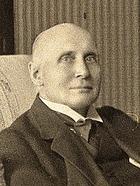
Alfred North Whitehead, OM, MRS (February 15, 1861 - December 30, 1947) was an English mathematician and philosopher. It is recognized as the figure that defines the philosophical school known as the philosophy of the process, which today has found application in a wide variety of disciplines, including ecology, theology, education, physics, biology, Economics and psychology, among other areas.
In his early years, Whitehead wrote mainly about mathematics, logic and physics. His most notable works in these areas are the three volumes of Principia Mathematica (1910-13), which he wrote with Bertrand Russell, a former student of his. Principia Mathematica is considered one of the most important works on mathematical logic of the twentieth century, and reached 23rd place in a list of the 100 best non-fiction books in English language of the twentieth century of the Modern Library.
Beginning in the 1910s and early 1920s, Whitehead began to focus more on the philosophy of science and finally on metaphysics. He developed a metaphysical system that radically came out of Western philosophy. Whitehead argued that reality consisted of processes, rather than material objects, and that processes are better defined by their relationships with other processes, so he refuted the theory that reality is fundamentally constructed by pieces of matter that exist in a way independent between each one. Currently, Whitehead's philosophical works, especially Process and reality, are known as the texts that founded the philosophy of the process.
The philosophy of the Whitehead process argues that "there is an urgency to see the world as a network of interrelated processes of which we are integral parts, so that all our decisions and actions have consequences for the world around us." reason, one of the most promising applications of Whitehead's ideas in recent years has been in the area of ecological civilization and environmental ethics, initiated by John B. Cobb, Jr.




